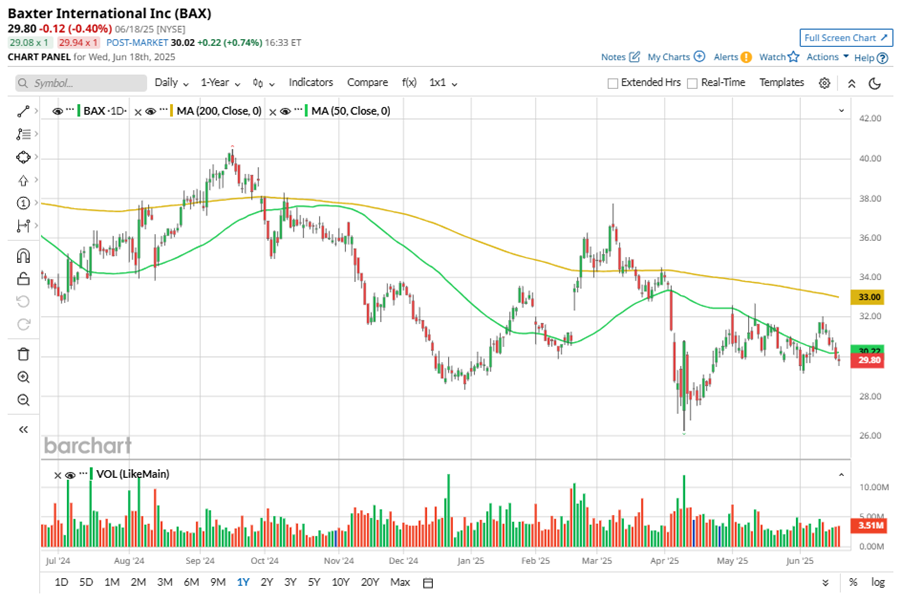/Baxter%20International%20Inc_%20logo%20on%20building-by%20JHVEPhoto%20via%20Shutterstock.jpg)
Baxter International Inc. (BAX), headquartered in Deerfield, Illinois, develops and provides a portfolio of healthcare products. With a market cap of $15.3 billion, the company develops, manufactures, and markets products and technologies related to hemophilia, immune disorders, infectious diseases, kidney disease, trauma and other chronic and acute medical conditions. The company's products are used by hospitals, kidney dialysis centers, nursing homes, rehabilitation centers, doctors' offices, and research laboratories.
Companies worth $10 billion or more are generally described as “large-cap stocks,” and BAX perfectly fits that description, with its market cap exceeding this mark, underscoring its size, influence, and dominance within the medical instruments & supplies industry. Baxter excels through diversified healthcare products and innovative expansions. Strategic acquisitions enhance its connected care solutions, while investments in new launches and geographic growth solidify its medical technology leadership.
Despite its notable strength, BAX shares have slipped 26.4% from their 52-week high of $40.49, achieved on Sep. 17, 2024. Over the past three months, BAX stock has declined 13.7%, underperforming the Nasdaq Composite’s ($NASX) 11.7% gains during the same time frame.

In the longer term, shares of BAX rose 2.2% on a YTD basis, outperforming NASX’s YTD gains of 1.2%. However, the stock fell 11.7% over the past 52 weeks, underperforming NASX’s 9.4% returns over the last year.
To confirm the bearish trend, BAX has been trading below its 50-day moving average since early April, with slight fluctuations. The stock has been trading below its 200-day moving average over the past year, with some fluctuations.

BAX's underperformance can be linked to significant costs incurred due to Hurricane Helene, exposing operational risks at its North Cove facility that supplies a majority of IV fluids in the U.S. This highlights vulnerabilities within the company's operations.
On May 1, BAX shares closed down more than 1% after reporting its Q1 results. Its revenue stood at $2.6 billion, up 5.4% year over year. The company’s adjusted EPS declined 4.6% year over year to $0.62.
BAX’s rival, Becton, Dickinson and Company (BDX) has lagged behind the stock, with its shares plummeting 25.7% on a YTD basis and 27.9% over the past 52 weeks.
Wall Street analysts are moderately bullish on BAX’s prospects. The stock has a consensus “Moderate Buy” rating from the 15 analysts covering it, and the mean price target of $36.64 suggests a potential upside of 23% from current price levels.







